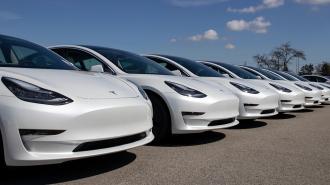President Biden aims to have 50% of all new vehicle sales be electric by 2030, a goal that critics have branded as preposterous. And 50% may seem like a stretch. Even predictions from electric vehicle (EV) proponents suggest that the White House’s goal will fall short.
EVAdoption estimates that EV sales will grow to just 29.5% of all new vehicles in the US in 2030. The International Energy Agency (IEA) projects a US EV share of 20% in 2030, based on existing policy and trends. That’s still a sizable jump from just 5.7% of vehicle sales in 2022, and would represent a huge shift in transportation — but it’s not half.
However, as time has passed, actual EV sales keep running ahead of the projections. EVs accounted for 7.1% of US vehicle sales in the first quarter of 2023. The absolute number of EVs (246,624) sold in Q1 is more than five times the 47,663 sold in the first quarter of 2020, just three years ago. Over that same time period, overall US vehicle sales were essentially flat. Also in the first quarter of 2023, Tesla’s Model Y became the world’s best-selling car.
So while President Biden’s 2030 EV goal is indeed lofty, it’s not out of the realm of possibility, if current momentum is any indication.
Consumers’ willingness to buy an EV rose significantly compared to nine years prior.
More reason for optimism comes from a study recently published in the Proceedings of the National Academy of Sciences. Researchers primarily based out of Carnegie Mellon University conducted an in-depth survey of consumers interested in purchasing a new car and found that a significant minority are ready to choose an EV over an internal combustion engine vehicle right now.
Between December 2020 and September 2021, the authors presented nearly 1,600 potential buyers with hypothetical scenarios in which they chose between purchasing an internal combustion engine vehicle and its closest EV equivalent. A Hyundai Kona was pitted against a Kona EV, for example. And a Nissan Leaf was compared to a Nissan Versa.
While they found that most buyers would choose the gas-powered versions, they noted that consumers’ willingness to buy an EV rose significantly compared to nine years prior, when they ran a similar survey with a different set of new car shoppers. And this shift was entirely due to how much EVs have improved technologically in that time.
In 2012, the median range of an EV sold in the US was 80 miles. Today, it’s roughly 250 miles. They’re also quicker, with 0-60MPH acceleration times that smash most gas engines’, thanks to the instant torque from electric motors and improved battery power output. Fast-charging capabilities weren’t widely available in 2012, while today most EVs are capable of recharging from 10% to 80% in 20-40 minutes.
Based on consumers’ stated preferences in the two surveys, the researchers predict that by 2030, when EVs are forecast by the National Academies to have at least 300 miles of range and be priced comparably to their internal combustion engine counterparts, about half of new car buyers will choose an electric vehicle instead of a gas one.
Technological predictions are just predictions of course, so we’ll have to see if the falling prices, boosted range, and faster charging materialize. But if they do, the researchers’ survey data strongly suggests that most new car shoppers will be ready to purchase an electric vehicle in 2030.
We’d love to hear from you! If you have a comment about this article or if you have a tip for a future Freethink story, please email us at tips@freethink.com.
